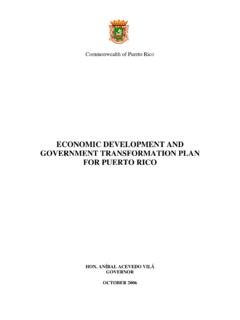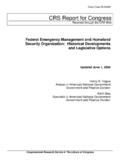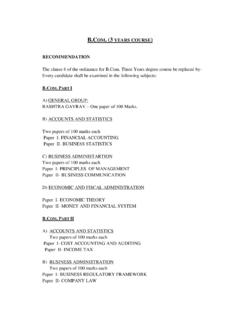Transcription of Planning and Implementation of District Health Services
1 world Health OrganizationRegional Office for AfricaBrazzavilleDistrict Health Management TeamTraining ModulesMODULE 4 Planning and Implementation of District Health ServicesAFR/ Chatora, Prosper TumusiimeWorld Health OrganizationRegional Office for AfricaBrazzaville 2004 District Health Management Team Training ModulesMODULE 4 Rufaro Chatora, Prosper TumusiimePlanning and Implementation of District Health ServicesAFR/ WHO Regional Office for Africa(2004)Publications of the world Health organization enjoy copyright protection in accordance with the provisions of Protocol 2 of the Universal Copyright Convention. All rights designations employed and the presentation of the material in this publication do not imply the expression of any opinion whatsoever on the part of the Secretariat of the world Health organization concerning the legal status of any country, territory, city or area or of its authorities or concerning the delimitation of its frontiers or mention of specific companies or of certain manufacturers products does not imply that they are endorsed or recommended by the world Health organization in preference to others of a similar nature that are not mentioned.
2 Errors and omissions excepted, the names of proprietary products are distinguished by initial capital letters. MODULE 4 world Health organization Regional Office for AfricaiiiContentsFOREWORD ..viiACKNOWLEDGEMENTS ..ixLIST OF ABBREVIATIONS ..xiOVERALL INTRODUCTION TO THE MODULES ..xiiiINTRODUCTION TO MODULE 4 ..xvUNIT 1: BASIC CONCEPTS OF District Health Planning ..1 Introduction .. Health Planning .. Reasons to Embark on District Health Planning .. The Planning Cycle .. Important Issues to Keep in Mind During the Planning Process ..5 UNIT 2: PREPARATION FOR Planning ..7 Introduction .. Preparatory Activities .. District Health Profile ..7 UNIT 3: Health SYSTEMS RESEARCH ..9 Introduction .. Why did HSR Develop? .. Examples of Possible Research Questions by Different Decision-makers .. Who Should be Involved in HSR? .. Guidelines for HSR .. Health Systems Research Process: Designing and Conducting HSR Projects .. Use of Research Findings for Decision-making.
3 HSR Training: HSR Proposal Development and Data Analysis Course ..18 UNIT 4: STEPS IN THE Planning PROCESS ..21 Introduction .. Situation Analysis and Problem Identification .. Problem Analysis and Prioritization .. Setting Objectives and Targets .. Formulating (developing) Interventions .. Determining Resource Requirements ..30 District Health MANAGEMENT TEAM TRAINING Preparing the Plan of Action .. Preparing the Budget .. Implementation .. Monitoring and Evaluation .. District Health Plan Write-up ..44 UNIT 5: ESSENTIAL Health PACKAGE ..45 Introduction .. Definition .. What Should be Included in the Package .. Determining the Content of the Package .. Steps to Follow in Selecting Cost-effective Interventions .. Determining Cost-effective Interventions ..51 UNIT 6: DISASTER PREPAREDNESS ..53 Introduction .. Some Facts about Disasters .. National and International Preparedness for Disasters .. What Should be Done at District and Health Facility in Case of Disasters.
4 Principles of Epidemic Control ..55 SUGGESTIONS FOR FURTHER READING ..57 ANNEX: DETERMINING THE ESSENTIAL PACKAGE USING DALYs ..61 LIST OF BOXES1. Possible research questions ..102. Main components of HSR proposal and HSR report ..133. Example of Kabwe District research team ..174. Example of use of research results ..185. HSR training series ..19 LIST OF FIGURES1. Three main determinants of District Health status ..12. The Planning cycle ..43. Steps in the development of a Health systems research proposal ..144. Steps in data analysis and report writing ..155. The Planning steps ..216. Example of a problem tree ..257. Example of an objectives tree ..27 MODULE 4ivPLANNING AND Implementation OF District Health Services MODULE 4 world Health organization Regional Office for AfricavLIST OF of an intervention matrix with objectives and targets .. of resource requirements for a programme for immunization of womenagainst neonatal tetanus .. of a plan of action matrix.
5 Of a cost analysis table .. Example of a line budget ..35 Example of a programme budget for maternal and child Health (MCH) by line itemand programme component (recurrent costs) .. Example of a programme budget for maternal and child Health (MCH) by line item and programme component (capital costs) .. of a performance budget .. of classification of costs by inputs .. of cost by input category .. shared costs ..4810. Example of determination of cost-effective intervention ..5211. Standard life expectancy and DALYs lost due to premature death at each age .. the severity of disability classes and weights set by GBD protocol for 22indicator conditions ..63 MODULE 4 world Health organization Regional Office for AfricaviiviiForewordHealth systems in Africa are undergoing considerable change, often in a context of ongoing Health sec-tor reforms. In most countries, decentralization of Health Services is very central to these changes, andconsequently there is a need to prepare and empower those working at the District level for their newresponsibilities and tasks.
6 Many countries have requested WHO/AFRO to support them in the imple-mentation of the change processes at the District level, and the Regional Office is giving special attentionto these requests. Apart from the technical support that WHO can provide to the countries concerned,several support tools, modules and frameworks have been and are being developed to support thestrengthening of District Health systems. The training modules are intended for use by District Health management teams (DHMTs) with theobjective of developing the capacity to address the problem areas identified from the assessment of dis-trict Health systems operationality. In addition, the modules could also be used during basic training ofhealth personnel. Tools for the assessment of District Health systems operationality are already availableto the should make use of these training modules so as to enhance the effectiveness of the prior-ity programmes they are implementing in order to improve the performance of their Health systems.
7 It isclear that the success of Health systems largely depends on the performance of the Health system at imple-mentation levels, namely District and community. The training modules address practical issues criticalfor the improvement of Health systems at those hope that countries and especially District Health management teams in the Region will make opti-mal use of the training modules in order to enhance their capacity to address the priority Health prob-lems that we are facing every Ebrahim Malick SambaRegional DirectorMarch 2003 MODULE 4 world Health organization Regional Office for AfricaixAcknowledgementsThis publication is an effort to respond to the different needs for capacity building in management andimplementation of Health programmes and delivery of essential Services . It reflects the thinking acquiredfrom experience working with Health sector reforms being implemented in the African Region. The District Health Management Training modules are meant to be used as generic materials whichmay need to be adapted to country-specific situations.
8 They cover the principles that are applicable acrossthe Region and are meant to guide and strengthen the management capacity of District Health manage-ment teams. We would like to express our sincere gratitude to all those who have contributed to the developmentand review of the previous versions of the modules. Dr Sam Nyaywa, working with colleagues in theDivision of Health Systems and Services Development (WHO/AFRO), provided the first draft in thanks also go to the Institute of Primary Health Care in Iringa and the Centre for Education andDevelopment in Health , Arusha (CEDHA), both in Tanzania, which participated in the testing and revi-sion of the modules. We also would like to express our appreciation to the Zimbabwe team who reviewedthe modules and the WHO Tanzania Country Office team for their also wish to express our thanks to Dr L. G. Sambo, Dr R. R. Chatora, Dr Peter Petit, Dr Petit-Mshana, Dr M. Belhocine, Dr K. Manlan, Ms M. Mohale, Dr J. Mwanzia, Dr K.
9 Nguyen, Dr B. Tour , DrM. Kiasekoka, Dr P. Tumusiime, Dr M. Niang and other colleagues in various divisions in WHO/HQ andAFRO who contributed to one or more stages of the development of these modules. MODULE 4 world Health organization Regional Office for AfricaxiList of AbbreviationsAFROWHO Regional Office for Africa AIDSA cquired immunodeficiency syndromeARIA cute respiratory infectionAWPA nnual work planCBRC rude birth rateCDRC rude death rateCEDHAC entre for Education and Development in Health , ArushaDALYsDisability adjusted life years DHMTsDistrict Health Management TeamsDHPD istrict Health PlanDMCHCD istrict Maternal and Child Health CommitteeDMOD istrict Medical OfficerFPFamily planningGBDG lobal Burden of DiseaseHIVH uman immunodeficiency virusHMISH ealth Management Information SystemHQHeadquartersHSRH ealth Systems ResearchIMRI nfant mortality rateIPDI npatient DepartmentMCHM aternal and Child HealthMMRM aternal mortality rateMoHMinistry of HealthNGOsNongovernmental organizationsOPDO utpatient DepartmentPHCP rimary Health carePHNP ublic Health nursePRAP articipatory Rural AppraisalRHMTR egional Health Management TeamSTDS exually transmitted diseaseTBTuberculosisTBAT raditional birth attendantTVTelevisionU5 MRUnder-five mortality rateVDCV illage Development CommitteeWHOW orld Health organization MODULE 4 world Health organization Regional Office for AfricaxiiiOverall Introduction To The ModulesThis is one of a set of four management training modules aimed
10 At District Health Management Teamsin the countries of the African Region. There have been considerable achievements in African countries as a result of Implementation of thePrimary Health Care (PHC) strategy. However, Health problems and ill- Health continue to exist despitethese laudable initiatives; for example, inequity in Health care delivery still exists. Health systems andprogrammes are often blamed for inefficiency and ineffectiveness, putting them under pressure to be re-orientated and setbacks have been partly attributed to the continuing economic crisis and lack of , much has to do with poor management, especially in the organization of District Health sys-tems and the difficulties faced in translating PHC principles and Health Sector Reform proposals problems can be attributed to lack of appropriate knowledge, skills and capacities among thosewho are responsible for managing District Health systems and programmes. The gap which existsbetween training of District Health managers and what they are called upon to do, poses one of the majorissues to be addressed for the achievement of Health sector reform objectives as well as the goal of of DHMTs in Health management has been going on for some time.

















